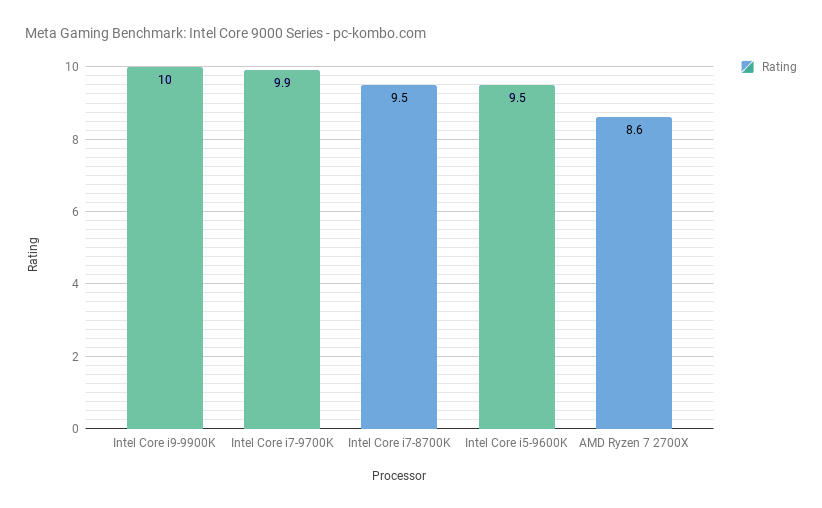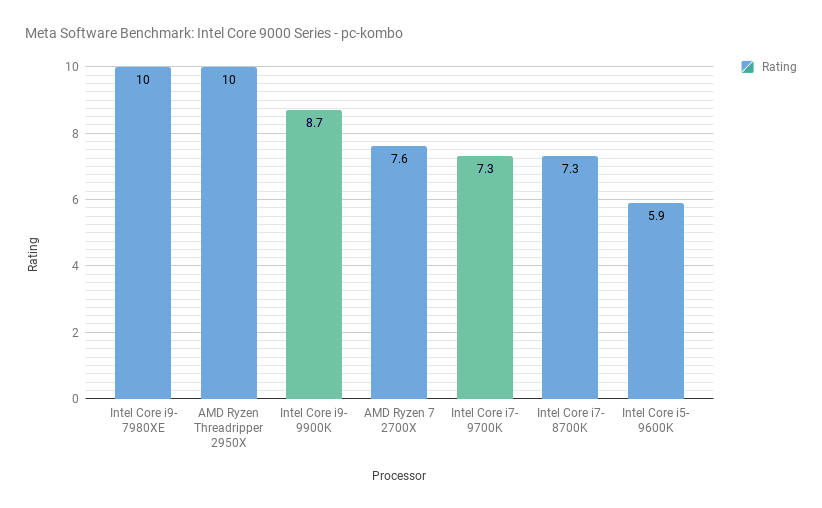Intel’s new processors were announced as the fastest gaming processors, and to be also quite fast in other application workloads. Coffee Lake Refresh includes three processors:
- The i9-9900K, with 8 cores and 16 threads, currently at $579.99
- The i7-9700K, with 8 cores and 8 threads, currently at $409.99
- The i5-9600K, with 6 cores and 6 threads, currently at $279.99
All of them reach a high turbo clock: the i9 5.0, the i7 4.9 and the i5 4.6 GHz - without overclocking.
That is a very special release. It’s the first time that Intel releases consumer processors with 8 cores. It’s also the first time Intel releases an i7 without hyperthreading, presumable to give the new i9-9900K a reason to exist. And it’s the first reaction to AMD’s Ryzen processors where Intel had some time to prepare.
Now, we already know the i9-9900k gets hot. But how is the performance? Also the i7-9700K is very interesting this time: Its predecessor, the i7-8700K, had only 6 cores but with 12 threads 4 threads more. Will the missing hyperthreading limit the performance more than the two additional cores and the higher turbo clock can make up for?
Over the last days I gathered reviews for the pc-kombo meta benchmark. The meta benchmark creates a global order out of many distinct smaller benchmarks, currently more than 282. Based on that benchmarks one can not judge how many FPS a processors will reach exactly, but one can judge which processor is faster overall.
Let’s look at gaming performance first:
To see exactly which benchmarks were used, check the comparison page.
The i9-9900K is the fastest gaming processor overall. As the core and thread counts suggest it beats the 9700K. And the i7-9700K beats the former champion, the i7-8700K: Turns out that hyperthreading is less useful than having more cores available. The higher turbo block also won’t hurt this result.
For everyone wanting to use less money it will be nice to know that the i5-9600K stays quite close to the i7-8700K. Since the i7-8700K is not that much slower than the i7-9700K that means that the i5-9600K is still a good option for high FPS gaming, with a similar performance as the i5-8600K. As a result the Ryzen 7 2700X can’t compete here.
However, let’s not forget that the gaming performance of the Ryzen 7 2700X and the Ryzen 5 2600X is still high enough to play all current games properly. It’s just in the high FPS area where Intel was already stronger before this release, and now has a slightly higher lead.
Outside of gaming Intel also reach a very high position with its new processors:
Again, to see exactly which benchmarks were used, check the comparison page.
Finally reaching 8 cores lets Intel overtake the Ryzen 7 2700X in the software performance benchmark, a big win. But the difference is not as big as in gaming, and the smaller chips do not win against the Ryzen processor. Having 16 threads available helps the Ryzen processor against the i7-9700K. And the i5-9600K does not fare well in this benchmarks, though the 9600K did not see many reviews yet and will likely improve later on when more data is added. It should also be noted that software performance is a huge field, and in some applications the performance rating will be more similar to the above gaming performance.
Still, it’s a good result for Intel. The i9-9900K gets a good rating here, and also the i7-9700K does very well. The real stars of this benchmark are processors with an extremely high core count, like the workstation i9 and Threadripper. But this is the best result Intel could have hoped to reach on their consumer platform: Beating the AMD Ryzen 7 2700X on raw performance.
Time for a conclusion. The 9000 series has some issues. Those are hot processors that eat a lot of energy, and they are also very expensive, especially the i9-9900K. But with that i9-9900K Intel for the first time since Ryzen placed a processor on the consumer market that can beat AMD on gaming and multi-threaded application performance, while before Intel only had a lead in gaming. But the i9 is sadly also very expensive, making the Ryzen 7 2700X for many budgets a more attractive option.
The i7-9700K and the i5-9600K are less special. They replace the i7-8700K and the i5-8600K and deliver a small performance improvement, but they do not change the overall situations: Less performance in multi-threaded software workloads than Ryzen, but a better performance in gaming.
As a result, the i9-9900K is the best option currently for those wanting the absolute best performance without making the step to a way more expensive workstation processor, but only for those willing to also buy the best possible cooling hardware and willing to disregard price-performance. The i7-9700K and the i5-9600K can be interchanged with the i7-8700K and the i5-8600K depending on their price, they are best suited for gaming builds targeting 144 FPS. For regular 60Hz gaming (regardless on which resolution) the Ryzen 5 2600X and the Intel Core i5-8400 are still the smarter option, with the Ryzen 5 2600 being a cheaper alternative.

